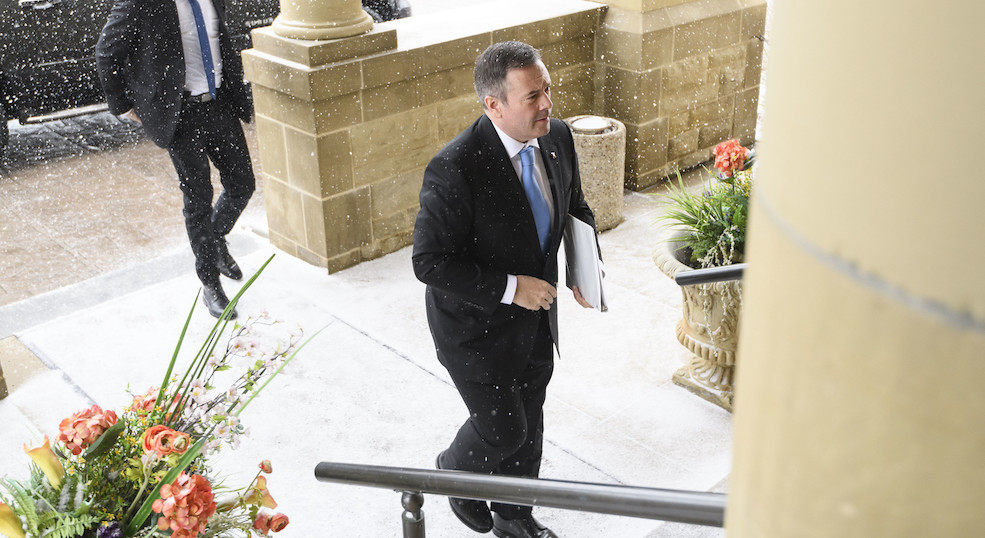Here are three predictions about Alberta Premier Jason Kenney’s inquiry into that “foreign-funded defamation campaign” against Alberta’s fossil fuel industry.
- It will be a gong show.
- It will cost far more than $2.5 million.
- It will end up harming the industry, and Alberta.
The roots of this likely debacle are found in the Public Inquiries Act, an overreaching and authoritarian piece of Lougheed-era legislation that is vulnerable to challenges under the Canadian Charter of Rights and Freedoms, which postdates it by a couple of years.
With the caveat that your blogger is not a lawyer, it seems obvious that the act’s sweeping overreach extends to denying witnesses at the whim of the commissioner — who can be anyone, even a partisan hack — protections they would have in a court of law.
Health information, sexual preference, secrets divulged to a spouse, a priest, or a physician, or information protected by the privacy statutes of Alberta and Canada would all appear to be fair game under this legislation.
A reader might reasonably ask: then why hasn’t it been challenged already? The answer is likely that there aren’t many inquiries, and those that have been conducted hitherto under this law have not been intended as witch hunts with a political agenda driven by revenge. But that was then, this is now, and the United Conservative Party is in power, so challenges are likely.
Even a politically motivated inquiry conducted by a retired judge, as alert readers of this blog will recall, ended up being pretty much a fiasco.
Moreover, since Kenney has made it clear in his own speechifying and social media posts that he intends to use the work of the inquiry to criminalize free speech and free association guaranteed by the charter, that opens new avenues of appeal should victims of the planned inquisition choose to take them.
Then there is the question of whether the entire inquiry is an exercise in bad faith conceived to allow the premier to exercise what he has called his “bully pulpit.” As Justice Ivan Rand of the Supreme Court of Canada famously wrote in 1959, “there is always a perspective within which a statute is intended to operate; and any clear departure from its lines or objects is just as objectionable as fraud or corruption.” (Emphasis added.)
In the case of the Public Inquiries Act, whatever it was drafted to achieve, it certainly wasn’t to enable a witch trial based on a half-baked conspiracy theory, nor was it intended to enable any premier to exercise open malice against the environmental movement.
Will the Kenney government’s inevitable, and inevitably time-consuming, defences of its conduct in the face of charter challenges be included in the inquiry’s supposed $2.5-million budget? They certainly will be part of the true cost, no matter how they are accounted for.
When Premier Lougheed’s boys sat down to substantially revise a 1939 Social Credit law, however, they added a bit of democratic window dressing in Section 12, which says parties defamed or put at risk of legal action have the right to cross-examine witnesses, either by themselves or through their legal counsel.
Of course, given the temper of the times, the drafters of the law also gave the commissioner the ability to yank the right to cross-examine away from witnesses, but that in turn presents additional problems for this particular inquiry and the government that has implemented it.
To refuse the right to cross-examine exposes the inquiry as a fraud. Moreover, it invites a witness from a target organization to seek an injunction to halt the inquiry on the basis it will cause irreparable harm while a charter challenge proceeds. Successful or not, that means the meter is going to be running, o taxpayers.
Needless to say, many of the environmental non-governmental organizations that are the intended targets of this inquisition will be ready to exploit this, extending the inquiry’s time frame, raising its cost substantially, and publicly shredding the credibility of some of the government’s prosecutorial witnesses.
I imagine we shall see performances so theatrical they are worthy of Milo Rau, the Swiss-German playwright-director who has based a career on deconstructing foreign legal travesties and tweaking the noses of dictators. (Even Vladimir Putin failed to stop him!)
It would be very hard for the commissioner, who is an accountant and civic public relations official, to keep this under control.
Moreover, unless the government can find a Court of Queen’s Bench judge willing to take part in such a charade (always possible, I suppose) it would appear that the inquiry has no power to hold anyone in contempt for, say, refusing to answer a question on the grounds it violates privacy law.
In addition, the inquiry has no authority outside Alberta, so anyone not from here who is disinclined to waste their time can just ignore it. However, I imagine most ENGO’s won’t want to squander the opportunity afforded by this soapbox.
More opportunities for drama and legal recourse will arise as the real litigators get their sharp teeth into this matter, of course, as doubtless is already happening.
But the foundation of a legal gong show at a dramatically higher cost, however it is accounted for, has already been built.
As for the damage to Alberta and its industry, I would think a travesty of justice and process as this is obviously intended to be would stiffen the spines and open the pocketbooks of opponents of oilsands development around the world, perhaps turning Kenney’s hitherto largely unfounded conspiracy theory into a self-fulfilling prophecy.
If you’re a defender of the Alberta oil patch, no good can come from that.
David Climenhaga, author of the Alberta Diary blog, is a journalist, author, journalism teacher, poet and trade union communicator who has worked in senior writing and editing positions with The Globe and Mail and the Calgary Herald. This post also appears on David Climenhaga’s blog, AlbertaPolitics.ca.




